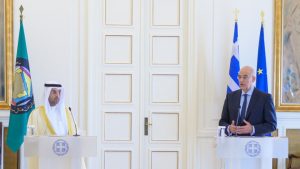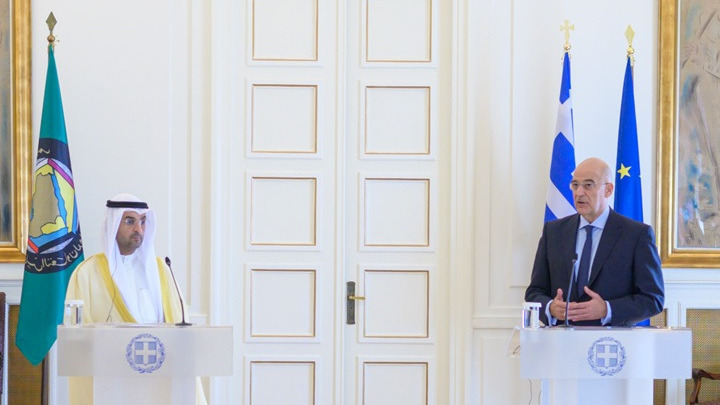“Greece has always displayed and will always display mature behaviour, a behaviour that accords with international law and the international law of the sea, as well as understanding for the internal political difficulties of the neighbouring country,” Foreign Minister Nikos Dendias said on Friday, at his meeting with the Gulf Cooperation Council Secretary General Nayef Falah M. Al-Hajraf.
Dendias said the meeting had discussed Turkey’s ongoing provocative behaviour towards Greece and Cyprus, including the casus belli threat if Greece extends its territorial waters to 12 miles, the daily violations of sovereignty and sovereign rights, Turkey’s invasion of a series of countries, including Iraq, Libya and Syria, where it had a military presence it should not have.
“It gives me no satisfaction to repeat the very long dialogue on Turkish provocations. I would rather talk about Turkey as a model country that accepts international law and our values. A country with a modernising European course. And I sincerely believe that this is what a great part of Turkish society wants,” Dendias added.
The foreign minister said he would rather talk of Turkey as a country that was not threatening Greece or the surrounding region but this Turkey must first be created: “The Turkey that we see is not what we want it to be and its behaviour is not that we would want to have,” he added.
Referring to relations between Greece and the Gulf states, Dendias pointed out that this was his third meeting with the GCC secretary general in six months, indicating that Greece’s relations with the area were becoming “constantly and significantly deeper”.
He noted the Greek prime minister’s recent trip to Saudi Arabia, his own recent visit to Oman and an upcoming trip to United Arab Emirates and Bahrain, as well as plans to visit Kuwait in early 2022, referring to a series of bilateral agreements and other initiatives with Arab countries.
“All these initiatives come under a common umbrella that leads to Greece’s efforts to open up new horizons for cooperation and to be a bridge between the Gulf and Europe,” he said, saying that these gave rise to new prospects.
“We also want to deepen relations between the GCC and the European Union, including by convening a ministerial meeting of the two organisations next year,” he announced.
Dendias said the meeting examined the full range of regional challenges, such as in Afghanistan, Yemen, Iran’s nuclear programme, the Middle East peace process and the commitment to the relevant UN Security Council resolultions.
“We hope for the coexistence of two states with Jerusalem as the capital of both states and I noted that the EU has repeatedly called for an end to settlements, stressing that this undermines efforts to find a solution on the basis of two states,” he said.
The GCC secretary general, on his part, emphasised the importance of security in the Mediterranean for the Gulf countries.
He said that relations between Gulf countries and Greece were based on mutual respect and a common outlook on many issues, as well as creating opportunities for growth and development benefiting both sides.
Referring to a cooperation memorandum signed in New York, he said that this helped complement the historically excellent relations between the two sides, and noted the talks underway on investments, education, culture, the environment, climate change and farming, so that trade relations might match the level of political relations.
He said the meeting also discussed the situation in Iraq, Syria, Lebanon, Yemen and Iran’s behaviour, stressing that Afghanistan must not become a refuge for terrorists and a threat to the region.
Finally, he highlighted the need for unity in Libya and said that all mercenaries and foreign troops must withdraw from that country so that the Libyan people can hold elections and elect their own government, which was recognised by the world.







